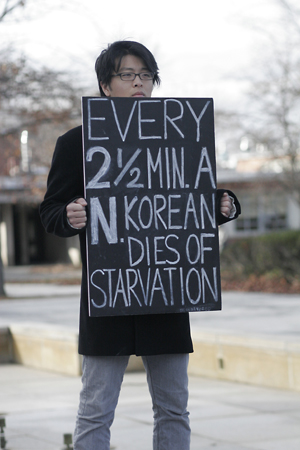
This morning marked the conclusion of a 24-hour vigil on campus in an effort by one student group to reach out to their brothers and sisters across the globe.
Members of Binghamton University’s Think: Liberty in North Korea, a student group dedicated to increasing awareness about the plight of citizens in the country, began a ’24-hour stand’ in front of the sundial at 10 a.m. yesterday for refugees overseas in the region, many of whom are experiencing famine and starvation, according to Philip Kang, the group’s president.
Kang said the organization’s goals capitalize on spreading awareness and raising money for Liberty in North Korea (LiNK) ‘ an organization dedicated to protecting human rights and helping the citizens of the country. Last year LiNK phased out many of its college chapters, including BU’s, which was replaced by ThiNK in support of the same goal.
‘Basically the reason for this 24-hour stand, even though it’s really cold and nobody is probably going to be outside at two in the morning, is that the problem still exists,’ he said. ‘Even though they’re 3,000 miles away and we can’t see them, I think what we’re trying to do is to try to symbolize that in a way.’
According to Kang, the ‘dire’ situation includes 13 million North Koreans suffering from malnutrition out of a total population of 23 million people.
Many refugees escape to China as an alternative to the rule of the North Korean government, but are caught and either executed or sent to political prison camps, which are ‘analogous to Holocaust concentration camps,’ Kang said.
‘It pretty much shocked me when I found out,’ said Samuel Huhr, a junior accounting member.
‘ I’m Korean and I don’t even know about my own brothers and sisters in a different country, so I was pretty stunned to know that there’s people starving, there’s people dying, there’s hundreds of thousands of people in political prison camps,’ Huhr said.
In addition to the vigil, members of ThiNK were displayed posters near the fountain of the Glenn G. Bartle Library all week.
Last year members of the group, which was still known as LiNK at the time, participated in a 10-day fast. During the fast, participants’ diets were modeled after that of a North Korean ‘ 250 grams of rice and a multivitamin each day ‘ a practice the group plans to repeat next semester.
Part of the reason for the group’s donations to LiNK stems from the latter’s foundation of underground shelters throughout China for refugees, Kang said.
Huhr added that funding from the group, consisting of nearly 200 members, goes to additional programs dedicated to accommodating North Koreans, such as an underground railroad for the refugees to travel to ‘more hospitable’ locations.


